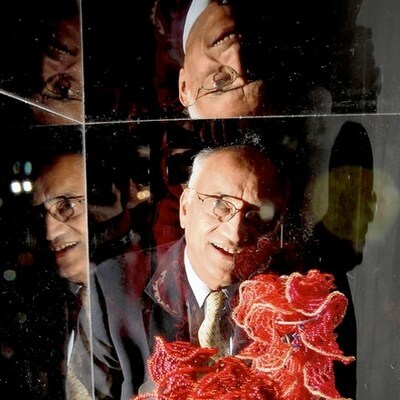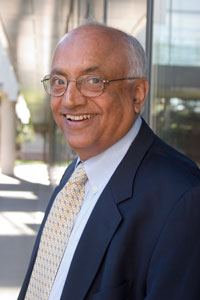News
The following article, "Reflections on the source of ideas," by Dick Ahlstrom, Science Editor, appeared in the March 26, 2010 edition of the Irish Times (login needed).
Barack Obama gets it and that gives Prof Venktesh “Venky” Narayanamurti cause for great optimism. He believes that science and engineering have the capacity to solve the great challenges that threaten our future, but only if leaders with vision can be found.
Harvard University’s Prof Venky was in Dublin two days ago to deliver a lecture at the Science Gallery at Trinity College, organised by the TCD/UCD Innovation Alliance. He discussed the role of science and technology in overcoming the global problems that face us today, from climate change to world hunger.
He touched on much wider issues, however, when speaking before his talk, encompassing his theories on education and social responsibility, the power of science and technology to deliver both good and evil, and how innovation and discovery can come from any quarter and from any country. Good ideas are not restricted to the first world alone, he argues.
And good ideas are essential if we are to overcome the many threats to our future, including energy supply, food stability, water resources and healthcare. He has no doubt that these ideas will come so long as the resources are put in place to allow them arise.
“Innovation today is coming from all parts of the world,” he says. “New discoveries will always arise because the human mind is a tremendous resource. Knowledge is infinite; science is infinite.”
Ideas are not a commodity that can be switched on and off, however. “You do not manage these great creators and discoverers, you nurture them,” he says.
To do this governments must provide “much more stable funding”, avoiding support that comes in fits and starts. Research is a long-term activity that must be supported over the long haul if we are to see discoveries converted into commercial products, Prof Venky says.
Lasers were invented 15 years before they were used with fibre-optics to support communications. And transistors were invented 15 years before the first integrated circuits were constructed.
“You do need to have stability,” he says, but also the patience to give good ideas time to deliver. He is beginning to doubt whether the US, the current world leader in innovation, will retain this position indefinitely. “I worry sometimes we don’t seem to have the patience now compared to India or China.”
Prof Venky has impressive credentials to comment on such issues. He is director of science, technology and public policy at the Kennedy school of government at Harvard. He transformed the university’s school of engineering during his more than a decade as dean of engineering and applied science there.
And he has advised Barack Obama on science and technology issues. He currently serves as an adviser to the Obama administration on energy policy.
Prof Venky takes a perhaps radical view of how universities will have to change to deliver much more rounded graduates. “Because science and technology is so pervasive today, you have to ask the question, what does a broadly educated person need?”
There are students at Harvard, one of the leading universities in the world, who don’t know where the electricity available in a wall socket comes from. “If you can’t even read your own electricity bill, what the heck is going on?”
With this in mind, he set up a new course for undergraduates along the lines of “technology for future presidents”. It includes basic exposure to scientific and technological ideas to increase the general understanding of these subjects, based on the assumption that perhaps in future one of these students might become a US president.
This in time will produce leaders with the vision to see how science can be used to deal with the grand challenges of our age. It requires support, a changed approach to education and leadership to overcome issues such as energy supply and climate change. Yet he says if the same effort, money and determination were put in place as was applied to the Manhattan Project that built the atomic bomb or the mission to put an astronaut onto the moon, then we would begin to see results.
“Great explorers and great countries always look to what is the future. Great nations and great leaders think about the future. The great challenge is to put great minds to work.”
These are the same ideas that he wants Mr Obama to understand, although he believes that the former senator from Illinois has already absorbed the message.
“The important thing is my president gets it,” says Prof Venky. “Obama gets it, because he has been appointing the right people to the right positions. Obama is putting the right people in place.”
Correction: The original article incorrectly states that Narayanamurti is an adviser to President Barack Obama. While he advises several panels of the Federal Government (including ARPA E), he has no direct role in advising the President.
Cutting-edge science delivered direct to your inbox.
Join the Harvard SEAS mailing list.
Scientist Profiles
Venkatesh Narayanamurti
Benjamin Peirce Professor of Technology and Public Policy, Engineering and Applied Sciences, and Physics, Emeritus

